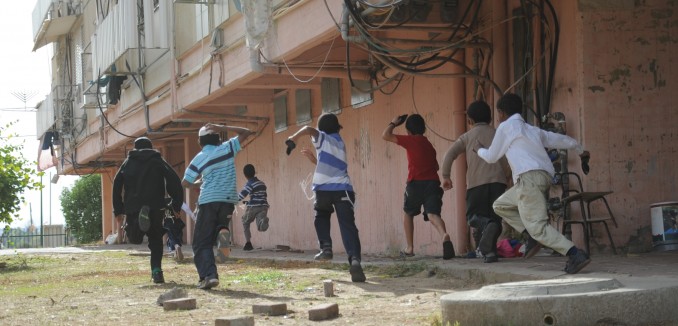Civilians in Israel’s south endured renewed rocket fire today as at least 10 missiles launched from the Gaza Strip slammed into the Sederot and Sha’ar Hanegev areas, triggering Israeli air strikes in retaliation. No injuries were reported on Israel’s side.
The violence comes amid two significant diplomatic moves that suggest a continued deterioration in efforts to restart U.S.-brokered peace talks between Israel and the Palestinian Authority (PA). According to the AP, senior Hamas figure Moussa Abu Marzouk traveled from Egypt to Gaza today to meet with Hamas leader Ismail Haniyeh in advance of a senior-level delegation of representatives of Mahmoud Abbas’ Fatah movement—with the aim of advancing reconciliation between Fatah, which rules the West Bank via the PA, and Hamas, which rules the Gaza Strip. A PLO representative based in Egypt, Azzam al-Ahmad, told the Ma’an news agency that the Fatah delegation is “going to Gaza… to end the state of disagreement and address three decisive issues.” These included:
We are going to address the formation of a national consensus government, elections and restructuring the PLO in order to maintain Palestinian unity so we can dedicate our efforts to confronting Israeli occupation.
Hamas is designated a terror organization by the U.S. State Department and many other countries, and its deliberate targeting of civilians, along with its launching of attacks from within civilian population centers, both constitute ongoing war crimes.
Meanwhile, the PA announced a set of seven new demands it was making as a condition for restarting talks with Israel—talks that ruptured earlier this month after Abbas stunned the international community by signing onto 15 international conventions that signified unilateral steps towards statehood in explicit violation of prior commitments as part of the peace talks framework. (Of the 15, the Palestinian Authority is in flagrant breach of at least 11.)
According to the Times of Israel:
Amin Maqboul, a member of the Fatah revolutionary council, told the Palestinian newspaper al-Quds that the Palestinian Authority would agree to an extension of negotiations if Israel agreed to: announce the basis on which future talks will be held; draw the outline of the borders of a Palestinian state within the next three months; halt settlement construction; withdraw Israeli troops from the West Bank’s Area C to the lines held before the Second Intifada; release the fourth wave of prisoners that it has until now refused to do; end what he called “disruptions” in Jerusalem and open Palestinian institutions in the city.
The combination of unilateral moves by the PA, the announcement of increasingly ambitious preconditions to coming to the negotiating table—including some, such as borders, that are obviously supposed to be the product of negotiations themselves—together with overt dialogue with Hamas and the implicit endorsement of ongoing violence against Israeli civilians that this entails, all raise serious questions about whether the Palestinians have made a strategic decision to turn away from U.S.-brokered peace negotiations and to re-establish themselves as the bastion of “resistance” (i.e., terrorism) that made the PLO so famous under Yasser Arafat. This concern is only increased with the Abbas’ resounding failure to denounce the Passover eve terror attack last Monday in which Baruch Mizrahi, 47, was murdered.
On the question of whether Palestinian rejectionism of peace initiatives is rooted in deeper causes than mere politics, see Deborah Danan’s essay in the Tower Magazine’s June 2013 issue.
(Photo: IDF / flickr / Wikipedia)




